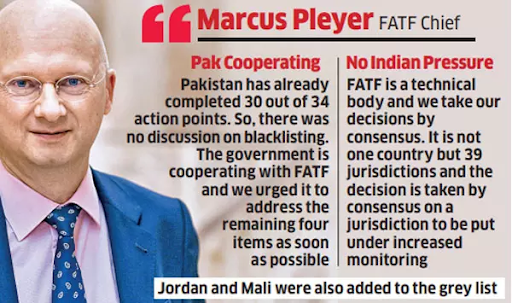International Relations
FATF Retains Pakistan on Grey List
- 22 Oct 2021
- 5 min read
Why in News
Recently, the Financial Action Task Force (FATF) retained Pakistan in the ‘greylist’ or 'increased monitoring list’.
- The FATF also announced the ‘greylisting’ of Jordan, Mali and Turkey.
- Botswana and Mauritius had been taken out of the grey list.
Key Points
- About:
- Pakistan is retained for failing to effectively implement the global FATF standards and over its lack of progress on investigation and prosecution of senior leaders and commanders of UN-designated terror groups.
- Pakistan will remain on the grey list till it addresses all items on the original action plan agreed to in June 2018 as well as all items on a parallel action plan handed out by the FATF’s regional partner - the Asia Pacific Group (APG) - in 2019.
- The Pakistan government has two concurrent action plans, with a total of 34 action plan items. It has largely addressed 30 of the items.
- Pakistan has made significant progress and it has largely addressed 26 out of 27 items on the action plan it first committed to in June 2018. The item on financial terrorism still needed to be addressed.
- The 2019 action plan largely focussed on money laundering deficiencies.
- The FATF had advised that Pakistan should continue to work to address its six strategically important deficiencies, which included enhancing international cooperation by amending the money-laundering law and demonstrating that assistance was being sought from foreign countries in implementing the UNSCR 1373 designations.
- The UNSC Resolution 1373 was adopted on 28th September 2001. It declares international terrorism a threat to international peace and security and imposes binding obligations on all UN member states.
- Background:
- The FATF had issued the 27-point action plan after placing Pakistan on the ‘Grey List’ in June 2018. The action plan pertains to curbing money laundering and terror financing.
- Pakistan was first put on the list in 2008, removed in 2009 and then again remained under increased monitoring from 2012 to 2015.
- Pakistan's inclusion in the grey list has adversely impacted that country's prospects of obtaining financial assistance from world bodies such as the International Monetary Fund, World Bank, and Asia Development Bank.
Financial Action Task Force
- About:
- An inter-governmental body established in 1989 during the G7 Summit in Paris.
- Assesses the strength of a country’s anti-money laundering and anti-terror financing frameworks, however it does not go by individual cases.
- Objectives:
- To set standards and promote effective implementation of legal, regulatory and operational measures for combating money laundering, terrorist financing and other related threats to the integrity of the international financial system.
- Headquarters:
- Its Secretariat is located at the Organisation for Economic Cooperation and Development (OECD) headquarters in Paris.
- Member Countries:
- The FATF currently has 39 members including two regional organisations - the European Commission and Gulf Cooperation Council. India is a member of the FATF.
- Lists under FATF:
- Grey List:
- Countries that are considered safe haven for supporting terror funding and money laundering are put in the FATF grey list.
- This inclusion serves as a warning to the country that it may enter the blacklist.
- Black List:
- Countries known as Non-Cooperative Countries or Territories (NCCTs) are put in the blacklist. These countries support terror funding and money laundering activities.
- The FATF revises the blacklist regularly, adding or deleting entries.
- Currently, Iran and Democratic People's Republic of Korea (DPRK) are under High-risk Jurisdiction or black list.
- Grey List:
- Sessions:
- The FATF Plenary is the decision making body of the FATF. It meets three times per year.





